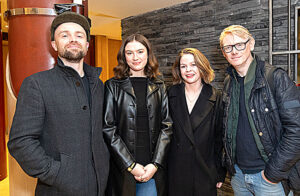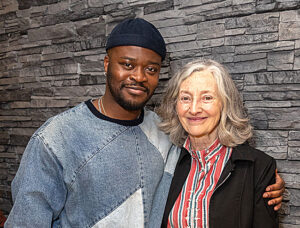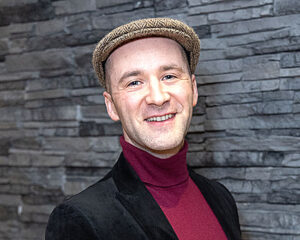
David Hennessy was at a recent London showcase of four Irish short films hoping for Oscar glory.
A special screening took place in London’s Courthouse Hotel recently showcasing four Irish short films that are all Oscar-qualified and all hope to emulate the success of An Irish Goodbye, winner of the 2023 Academy Award for Best Live Action Short Film.
The films Clodagh, Room Taken, The Boat and CALF have all been featured in The Irish World.
Clodagh and CALF also screened at the recent Irish Film Festival London.
Cast and crew from all films were in attendance.
Directed by TJ O’Grady-Peyton, Room Taken follows Isaac, played by Gabriel Adewusi, who is desperate for a place to stay and finds an unexpected answer to his temporary homelessness when he takes refuge in the home of Victoria, an elderly blind woman, without her knowledge.
Victoria is played by the great Irish actress, Bríd Brennan.
The film tackles pressing themes including the challenges faced by asylum seekers and the rising homelessness population in Ireland.
The film has also just had Colin Farrell come on board as executive producer.
Bríd Brennan told The Irish World after the screenings: “It was a great evening of Irish film.
“It’s very special to see short films like that each of them excellent in very different ways, and there was a very good reception.
“I particularly like the short film form and there was a wonderful display of talent in that field tonight, it was also lovely to sit with an audience who were so receptive. To hear the laughter was very heartening.
“I was sent the script and I thought it was a beautiful story dealing with loneliness, the loneliness of the immigrant and the loneliness of the bereaved, older woman living on her own.
“And I thought it was a strong story about homelessness, how it can happen to anybody.
“My character has lost her sight.
“I think it’s very important to actually deal with those issues, to think about them. And I think the film handles them with some levity as well.
“My friend, who’d never seen it before, really was laughing but moved then as well.
“I think it resonates, this film.”
Gabriel Adewusi added: “Honestly, it feels terrific (to be here).
“It’s an honour really.
“To see people’s response to the film has been so humbling and I’m just happy that people are getting to see it, people are relating to it, people are connecting to it.
“All these films have a real human core to them and I’m just really happy that I get to be a part of it.”

Room Taken deals with serious issues with a light touch..
“It’s crucial.
“I mean, the hardest things to take often need something that makes it go down a little bit easier.
“I knew that I wanted to come on board with this straight away because, first of all, the character shares the same ethnic background but aside from that, it’s something that’s really topical and really top of mind at the moment.
“In Ireland, there’s a housing crisis.
“There’s homelessness.
“People are really struggling at the moment and I just think it’s something that really touches close to home and it’s something that a lot of people can really connect to.
“There’s a very human need behind it.
“There’s desperation, there’s loneliness, there’s a lot there that sort of leads to where the film goes.
“There’s a very human core there. It’s something that can happen to any one of us at any time.
“We’re never too far away from it.
“I think it’s a real issue and I think the film does a really good job of showing that but also showing the humanity of it.
For the film to be involved in the Oscars conversation Gabriel said: “I’m chuffed. It is an honour to be in that conversation, honestly.
“It’s an indication that people are really watching it, people are really connecting to it, and people really understand it.
“I’m really happy to have been part of that.”
Producer Colmán Mac Cionnaith told The Irish World: “There’s some really serious and very current and important themes.
“It was very important for us to deal with that with a sort of levity and a little bit of hope because you see it a lot, especially in Ireland at the moment, it’s not a great situation for an awful lot of people.
“I think we were trying to structure it as well as kind of a fairy tale and build to this ending that we hope leaves people wanting to know more about our characters but also with a sense of hope at the end as well.
“It kind of blows me away every time I’ve seen it and I’ve seen it I don’t know how many times now at this stage.”
Made in Nepal, The Boat is the story of Dhuckia and her father Raoul.
The pair are close as father and daughter but life changes in an instant when Raoul realises Dhuckia has lost some sensation in her feet: An early symptom of leprosy. He takes her to a leprosy hospital, leaving her outside on the steps as she sleeps.
Before the credits roll, it is revealed that the story is true and Dhuckia’s father never returned for her.
What is also true is that the disease has a cure but many families can’t access it.
The film aims to raise awareness about the crushing threat leprosy still carries in rural communities throughout the world.
Writer/ director Luke Morgan told The Irish World: “It’s brilliant to be here representing The Boat short film.
“We were doing some work with The Mission to End Leprosy which is a charity headquartered in Dublin and he (Ken Gibson, CEO The Misson to End Leprosy) told us this heartbreaking story about a young girl called Dhuckia.
“Dhuckia’s story is essentially that she was a young girl who got leprosy now, in today’s environment which we were shocked by.
“Anybody we talked to says the same thing.

“When they hear that we’ve made a film about leprosy they say, ‘Is leprosy still a disease? Is it still out there? I thought that was a disease of Bible times’.
“But no, the unfortunate reality is that it’s still very much an issue in lots of places in the world.
“We wanted to appeal to people’s hearts rather than their heads so we made a piece of narrative cinema based on the true story of Dhuckia’s life.
“The fact that it’s so easy to eradicate leprosy, it’s so cheap that the fact that it still prevails and is still an issue in today’s world should be a great source of shame to humanity.
“Our film was, in essence, trying to tell a very simple human and emotional story between a father and his daughter, Raoul and Dhuckia and the choices that, unfortunately, sometimes we have to make in order to protect the ones that we love.
“We’ve been just blown away by the response we’ve gotten to The Boat.
“Cinema is a unique medium because it’s an emotional medium.
“If I was another filmmaker, I would have made a documentary on this but my skills and expertise and the skills and expertise of my brother Jake, the musician, lend themselves more to narrative cinema and with narrative cinema, you get the opportunity to place the audience into the shoes of one character and by telling one character’s story, you hopefully tell everybody’s story.
“That’s what we wanted to do with The Boat. It’s a story hewn from emotion, and we hope that it will continue to resonate with audiences going forward Oscars or no Oscars.”

Portia A Buckley’s Clodagh follows a lonely, devout, and rigorously honest housekeeper Mrs Kelly, played by Bríd Ní Neachtain, who discovers a young Irish girl with an exceptional gift, Clodagh (Katelyn Rose Downey).
Katelyn Rose Downey is a rising star whose credits include The Princess, The Nun 2 and now the Blade Runner TV series.
Portia A Buckley told The Irish World: “I feel very privileged to be in the mix with so many strong Irish films and I can’t wait to see the film with the rest of the audience because there’s nothing like a collective experience watching something on screen.
“I’m excited, looking forward to the audience’s reaction.”
What inspired Clodagh? “It’s about this priest’s housekeeper in rural Ireland who runs a local dance class on her day off and one day Clodagh, this young dancer, comes into the class and does the most spectacular dance and turns her whole life around.
“She (Mrs Kelly) comes across a moral conundrum which is whether or not she brings Clodagh into her class because she’s from another postcode, another area.
“It’s really a film about bureaucracy and red tape fundamentally coming up against passion and artistry.
“The fact that this young girl’s dance moves Mrs. Kelly so fundamentally to her core, she experiences passion like she’s never experienced before.
“The pairing of Bríd Ní Neachtain, who’s an incredible actor, incredible presence, incredible professional, incredible on screen, with Katelyn Rose Downey, a two time world Irish dancing champion, who also happens to be an incredible actor, was great.
“She’s actually currently doing the Blade Runner TV show, shooting in Prague.
“She played the part so naturally and effortlessly which you don’t necessarily have with young actors.
“She’s really gifted.
“I think it’s a very hopeful movie and I think we need hope, especially now.
“I think it’s really about the fact that art can change people and can move people for the better.
“So very happy to be in the situation we’re in, and in such good company.”
Jamie O’Rourke’s IFTA-winning CALF tells the story of a sinister accident on a farm that leaves young Cáit with a terrible decision to make.
Cáit finds her father injured in a horrible farming accident but returns inside and says nothing of what has happened.
The film is brought to life by stirring performances from Isabelle Connolly as Cáit and Kate Nic Chonaonaigh (An Cailín Ciúin/The Quiet Girl) who plays her mother Áine.
Isabelle Connolly is a rising star in Irish and international cinema and has been tipped to follow in the footsteps of Saoirse Ronan and Eve Hewson.
Jamie O’Rourke told The Irish World: “It’s great to be here.
“It really is.
“The experience that inspired it was a documentary I worked on that was interviews with women who had fled to domestic abuse shelters.
“One in four Irish women at one point in their life will experience some form of abuse from a current or former partner.
“If you know more than four women, then you know somebody who’s experienced this.
“In Ireland we did traditionally keep these things behind closed doors.
“Actually Cáit and Áine, the two main characters, the mother and the daughter, they represent different stages of Ireland.
“In Áine the mother’s case, the Ireland that kept this stuff maybe behind closed doors as a general rule, whereas now I think we’re a bit more open.
“It hasn’t changed.
“Unfortunately, we’re seeing that domestic abuse is even on the rise in some cases.
“It certainly hasn’t gone away so I would encourage anyone to go to womensaid.ie and engage with what’s going on.
“CALF has done very well internationally, it’s resonated with audiences around the world.
“I think that’s for that very specific reason, it is an issue that doesn’t really know any borders.
“Any sort of news around Oscars and stuff like that brings awareness, brings focus onto those things that you made the film for in the first place.
“That’s always a positive.”
On Isabelle Connolly Jamie said: “She is a star.
“I remember the first day on set and about an hour into shooting our DOP Colm Hogan just said to me, ‘You believe everything she does’.
“She’s an incredible actress.
“She carries the whole film along with Kate Nic Chonaonaigh who plays Aine.
“Both of them are just powerful actors.”
Isabelle Connolly told The Irish World: “It’s always lovely to see Irish talent being showcased and Irish writers getting to share their stories.
“They were all so good and so touching and also really funny, which I think is a nice change of tone from CALF because it’s quite serious and has those horror tones.
“It’s really nice to see people identifying with it and liking it.
“It’s really difficult to get such a well rounded story across in such a short amount of time, but Jamie really did that.
“I think as an actor, it’s always interesting when there’s minimal dialogue. You have to invest yourself a lot more because you don’t really have your words to rely on.
“I think that’s always a challenging but fun thing to do as an actor.
“I also remember the suspense and the intrigue of the story, not knowing why she’s doing these things and where the story is going and then finally the reveal at the end is just that much more of a punch.
“I just knew I really wanted to be a part of it because I knew it was going to be something really special.
“I think people are finally starting to see the amount of talent that Ireland has to offer.”
On the comparisons she is getting to some big names Isabelle said: “I’ve never heard it personally.
“I don’t know if I actually believe people have said these things about me but it would be flattering because these people are just insanely talented and to do even a fraction of what they’ve done would be amazing for me.”
The short list for the Oscars will be announced on 17 December. The nominations will be announced on 17 January 2025.


